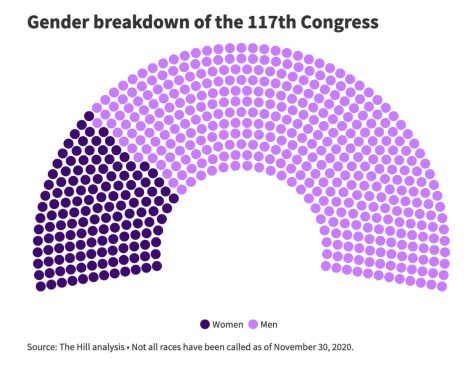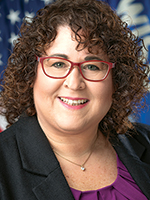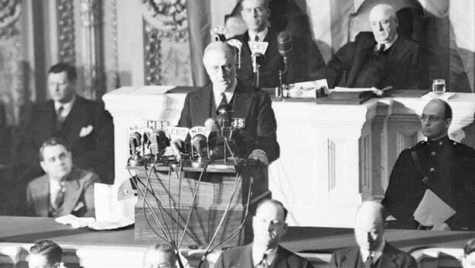Gender Divides in Congress
The United States Congress was structured by cis men, for cis men. As generations pass, America has changed its rhetoric, Instagram posts, and even passed a law occasionally to create the facade of progress, but while we have made major legislative strides, we haven’t reached true equality. The Equal Pay Act was enacted in 1963, and yet women make 77 cents for every dollar a man makes. The 19th Amendment was passed, but men remained the vast majority in the political sphere. And this is especially evident in Congress, the one place that can get laws passed and things changed for people nationwide. Feminine presenting and transgender people have been consistently dissuaded, shot down, and deterred from pursuing a career in politics.
It has taken far too long to elect a non-cis man. According to the Pew Research Center, the first woman was elected to Congress in 1916. And yet even today – a century since the first woman was elected to Congress – only a quarter of the representatives in the House are women. Keep in mind, the first Constitutional Convention was in 1787, meaning that it took women over a century to have one female representative. This is unacceptable for a number of reasons, but one is the fact that the Equality Act, a bill that was proposed in 2019, still hasn’t been passed. If the Equality Act was passed, it would “meaningfully expand civil rights protections for many Americans and advance equal treatment for LGBTQ people, women, people of faith, and people of color. The concrete benefits of the landmark civil rights laws that it would amend are clear—it’s time to extend these benefits equally to all,” according to American Progress. If women had equal representation, then there would be a much greater chance of this passing. But this unequal divide greenlights discrimination nationwide, putting the US at a stalemate when attempting to confront sexism and homophobia. This bill could be monumental in giving women power, which would make running for office attainable for millions more. But instead, the US chose to tell them no, and equality for more than half of the nation took the fall.

That being said, political opportunities have been even worse for trans people. According to NBC, Sarah McBride was the first out transgender person to ever be elected as a state senator. This happened in 2020, just 2 years ago. Trans people have been pushed to the side and underrepresented for generations, and representation is barely growing today. Politicians want to be re-elected, and who wouldn’t when representing our country is a fairly lucrative and high-ranking job? Without that incentive and, in fact, the reverse of saying ‘I support the queers’ being potentially career-ending for notably Republican representatives (given their party’s general agenda), why would congressional members encourage queer representation into Congress? And the difference is by almost a hundred. According to Queering Congress, “Eighty-seven of the 101 LGBTQ Congressional candidates are running as Democrats, four as Republicans and three as Independents. Seven are unknown.” LGBTQ Democrats are more likely to run for Congress than LGBTQ Republicans, and Republican representatives thus have a more heterosexual and cisgender viewpoint, further hurting Congress. And yet, trans people are the anti-transphobic voices that are the most needed in Congress. According to LGBTQ Victory Fund spokesperson Elliot Imse, “When a trans, gender-nonconforming or nonbinary voice is in the room, it changes hearts and minds and leads us closer to a more inclusive society.” Transgender people are the ones that we need the most in order to break down homophobic laws and ideas. Trans legislators are key to giving transgender people power and encouraging acceptance, which is how we get somewhere for laws that ensure equal rights. But right now, Congress is starkly cisgender, and the effects are clear.
Finally, Congress is a pivotal place where rights are gained or lost in our country, and women and trans people are being left out of the discussion. 25% of the representatives in the House are women, while 50.5% of the US is women, and proportionally there should be at least ten trans people serving in the 535-person Congress, but that’s nowhere close to the case. If there was complete gender parity, then women would be more encouraged to run and wage laws could be more effectively enforced. And most importantly, it’d give women and trans people power in a world that undermines both. This divide is destroying the lives of millions because of simple genetics and history, and we can’t allow it to continue because if we allow this injustice to continue, allowing over half of our country’s voices to go unheard, the effects will scar our country forever. Otherwise, women and trans people will continue to lose their rights until the civic sphere looks less like a 50/50 gender split, and more like a 99/1.
Sources:
https://www.americanprogress.org/article/need-know-equality-act/












